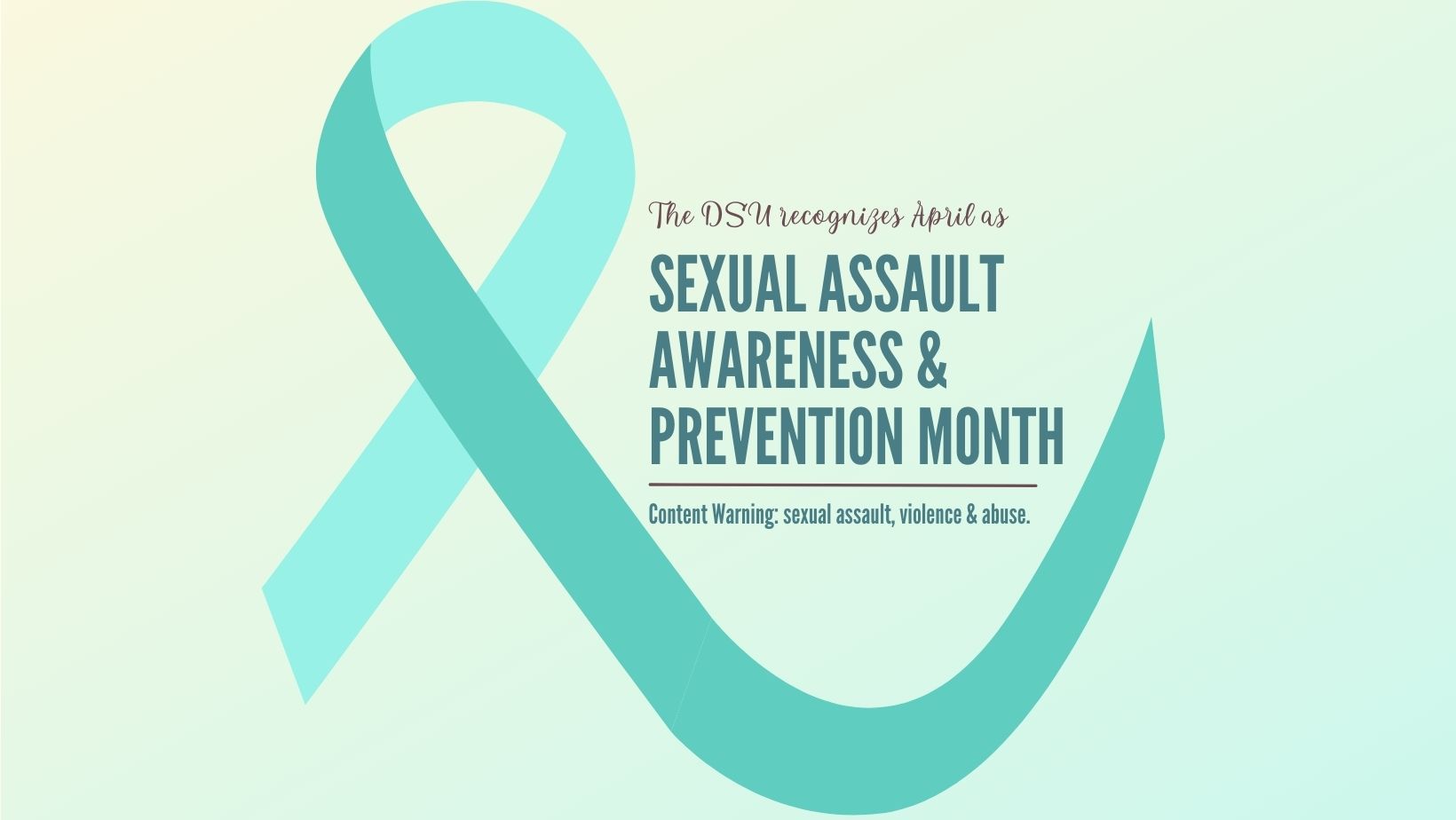The Douglas Students’ Union recognizes April as Sexual Assault Awareness & Prevention month
WHAT IS IT? AND WHAT ARE THE SIGNS?
Sexual assault is any sexual interaction that occurs without the consent of both parties. It might take the form of unwanted sexual contact or coercive sexual intercourse. It can occur even if two people are familiar, married, or dating. Sexual assault occurs when someone does not consent to sexual interaction. It can manifest in various ways, including the following:
- Your comments or actions showed that you were not interested in having or continuing sexual contact, but sexual contact occurred.
- You consented to sexual contact as a result of a threat or use of force against you.
- You lacked the capacity to consent to sexual interaction (for example, you were drugged, impaired or have a disability)
- Someone coerced sexual intercourse with you by utilizing their position of authority or control over you.
Let’s remember that – Strangers can commit sexual assault. However, it is most frequently done by someone who is familiar to the victim, such as a family member, friend, or someone in a position of authority or trust.
WHAT SHOULD I DO?
- Whether or not you decide to report it right away, it is important to:
- Seek medical attention
- Understand that it is not your fault
- Deal with your emotions in a way that you deem appropriate – with the assistance of your closest circle of support, whether that is a friend, family member, or emergency service.
HOW TO HELP A FRIEND?
People close to us may find themselves in this situation, and we want to be there to help them. What you can do for them is:
- Reassure them they do not cause the abuse
- Help in the making of an emergency safety plan
- Remind them they are not alone and all the help they can get if needed and wanted
- Give them information about support groups, crisis lines, transition houses or safe places
- Listen, support, and validate their emotions
- Offer to help them with other responsibilities in their life – even something that might seem so simple could be of great help for them (children, elder caretaking, a ride, grocery shopping, etc)
HOW TO CREATE A SAFETY EMERGENCY PLAN?
A safety plan is a strategy for dealing with an assault that has occurred or is about to occur. The following information is essential to assist your friend in developing a plan that will work:
- When are the assaults most likely to occur? Are they foreseen?
- What does the partner do or say before the assault?
- Where could your friend go before an assault to protect oneself and children?
- Is there a supportive friend or relative who can provide a place to stay?
- Does the presence of a third person lower the possibility of the partner assaulting? If so, can they accept someone to spend the night in their home?
- How could your friend get assistance if they can’t get out before an assault? Where can they go, who can they call, and how can they get to a safe location?
More info can be found on the BWSS Website here.
Create their own personalized safety plan here.
OTHER WAYS TO SHOW SUPPORT:
- Believe them
- Remind them they are not to blame
- Remind them they are not alone and the multiple people and services they can count on
- Acknowledge their experience and how it has affected them
- Avoid judgement
- Check-in periodically
- Know your resources
RESOURCES:
- Atira Women’s Society
Phone: 604-800-8881
Website: https://atira.bc.ca/
- Battered Women’s Support Services
Crisis line – text- 604-652-1867
Email: intake@bwss.org
Website: https://www.bwss.org/
- Indigenous Women’s Program @ BWSS
Crisis line: 604-687-1867
Business Line: 604-687-1868
Website: https://www.bwss.org/support/programs/indigenous-womens-programs/
- VictimLinkBC
Toll-free, confidential, multilingual, 24 hours a day, 7 days a week.
Phone: 1-800-563-0808
Email: VictimLinkBC@bc211.ca
Website: www.victimlinkbc.ca
- Women Against Violence Against Women (WAVAW)
Vancouver
Phone: 604 255 6344
- Vancouver Island Crisis Line
Vancouver
Phone: 1 888 494 3888
- Surrey Women’s Centre Mobile Assault Response Team
Surrey
Phone: 604 583 1295
- Victoria Sexual Assault Centre
Victoria
Phone: 250 383 3232
- Prince George Sexual Assault Centre
- Ending Violence Association of BC
- Community-Based Victim Services
- Stopping the Violence Counselling Programs
- Stopping the Violence/Multicultural Outreach Programs
- British Columbia Society for Male Survivors of Sexual Abuse
- Government of BC Victim Services

